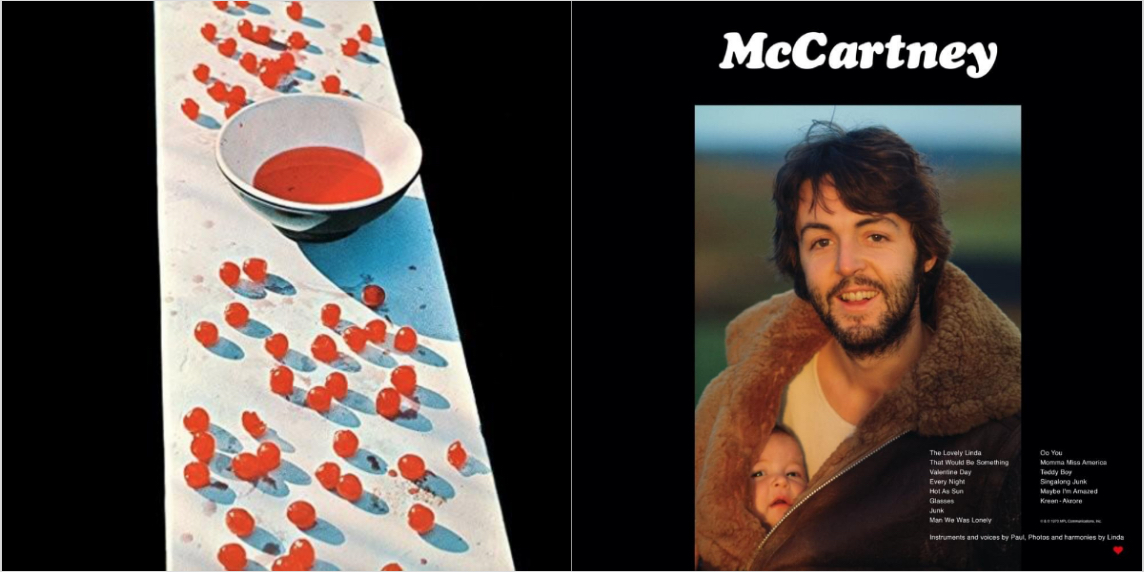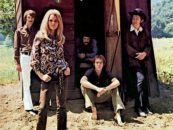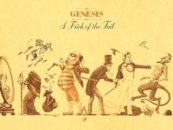
The front and back cover of 1970’s McCartney LP
Over the past decade or more, advances in recording technology have made do-it-yourself albums a relatively uncomplicated proposition. Time was, however, that “one-man-band” albums were painstaking affairs, the music equivalent of piecing a puzzle together from intricately cut shapes.
One thing is certain: playing all the instruments and performing all the vocals on full-band arrangements requires a special set of skills, something that was never truer than during rock’s “classic” era. We’ve chosen 10 one-man-band albums that, in our view, represent the cream of the crop.
John Fogerty—Centerfield (1985)
Fogerty recaptured his songwriting mojo with this brilliant album, which earned the former CCR leader his first #1 record since leaving his old band. Sunny rockers such as “Rock and Roll Girls” and the title track recalled the glory days of AM radio, while “The Old Man Down the Road” sizzled with swamp-rock perfection. Working from meticulously crafted demos, Fogerty completed the project on a budget of just $35,000.
Roy Wood—Boulders (1973)
As co-founder of two pioneering British bands—the Move and Electric Light Orchestra—Wood proved himself a master of commercially viable pop music. With this do-it-yourself solo album, on songs such as “Songs of Praise” and “Wake Up,” he also showed that great melodies could accommodate his more eccentric tendencies. Immersing himself in absurdist humor and studio trickery, Wood sounds like he’s having the time of his life.
Skip Spence—Oar (1969)
Ignored upon its initial release, this harrowing album shared with Syd Barrett’s solo work a unique brilliance made poignant by the emotional instability of its maker. Following six months of confinement at New York’s Bellevue Hospital, the former Jefferson Airplane and Moby Grape member went into a Nashville studio to record songs written during his treatment. Playing and singing every part himself, the gifted artist crafted a masterpiece that’s since earned favorable comparisons to the more addled work of John Lennon, Frank Zappa and, of course, Barrett. Tracks like “Little Hands” (audio link below) and “Broken Heart” make you wonder what Spence might have produced if he’d continued to make solo recordings. Alas, it was his only official one.
Mike Oldfield—Tubular Bells (1973)
Some people dismiss Tubular Bells as an archetype for New Age music, but there’s no denying the album’s brilliance with regard to both conception and execution. Just 19 years old when he made the record, multi-tracking 99 percent of it himself, Oldfield crafted a 50-minute conceptual epic, whose only tracks were titled “Tubular Bells, Part One” and “Tubular Bells, Part Two,” that drew from rock, classical and British and Irish folk music. Not only did Tubular Bells provide the horror film The Exorcist with the most memorable section of its soundtrack, it also helped earn Virgin Records founder Richard Branson his first fortune.
Steve Winwood—Arc of a Diver (1980)
A former teen prodigy, Winwood was considering leaving the entertainment business when he crafted this do-it-yourself masterpiece. Recorded at the singer’s farm in Gloucestershire, north of London, the songs framed Winwood’s blue-eyed soul in languid tempos and atmospheric arrangements. The Top 10 hit, “While You See a Chance,” as well as killer tracks like “Night Train” and “Dust,” helped set the stage for a heavy MTV presence that soon pushed Winwood’s career to further heights.
If you’re a new reader of ours, we’d be grateful if you would Like our Facebook page and/or bookmark our Home page.
Foo Fighters—Foo Fighters (1995)
Few knew, but during his tenure with Nirvana, Dave Grohl was quietly amassing a collection of home recordings that would serve as the foundation for his first post-Nirvana album. The eponymously titled Foo Fighters gathered the best of those recordings, among them “This is a Call” and “I’ll Stick Around,” into a pop-punk triumph. In a classy move, following the album’s release, Grohl opted not to grant interviews or perform in large venues, presumably in deference to the memory of Kurt Cobain. In an ironic twist, the record was nominated for a Grammy in the “Best Alternative Music Album” category, but lost out to Nirvana’s MTV Unplugged in New York.
Prince—Dirty Mind (1980)
Released four years before the Purple Rain soundtrack catapulted Prince to stardom, this one-man tour de force couched bawdy subject matter in pulsating, suggestive R&B. Much like Stevie Wonder before him, Prince was a studio wiz and a songwriting dynamo, and with Dirty Mind, he found the musical voice that would carry him through his next several albums. “Head” and “Uptown” weaved brickhouse funk into synth-based arrangements, while the dance-pop track “When You Were Mine” constituted funk-pop at its most irresistible.
Emitt Rhodes—Emitt Rhodes (1970)
Though hardly a household name, Rhodes inspired scores of do-it-yourself recording artists with this relatively obscure pop-rock classic. Released the same year as Paul McCartney’s solo debut, the self-titled album was rife with jaunty melodies (check out “Somebody Made for Me” below) and quirky hooks that, in their inventive spirit, rivaled those of the former Beatle. Long consigned to cult status, Rhodes enjoyed a resurgence of sorts when his song, “Lullabye,” was featured in the 2001 film The Royal Tenenbaums.
Todd Rundgren—Hermit of Mink Hollow (1978)
For his eighth solo album, Rundgren returned to the dazzling pop spirit of past records such as Todd and Something/Anything?—the latter of which was very nearly a one-man-band opus in its own right. Emerging from a breakup with Bebe Buell (Liv Tyler’s mom), the eclectic artist wrote and recorded a clutch of ear-friendly tunes, among them, several of which were tinged with heartbreak. Reportedly, a record company executive balked at the original song sequence, insisting that the “poppier” tunes be collected as a set—and the rockers, likewise. Rundgren complied, labeling one side the “Easy Side” and the other the “Difficult Side.” Standout tracks include “Can We Still Be Friends” and “All the Children Sing.”
Paul McCartney—McCartney (1970)
McCartney opted to take a low-key approach for his first post-Beatles album. Doing most of the work in his home studio, the songwriting maestro burnished a brilliant set of pop rockers and ballads with subtle, organic brush strokes, eschewing studio polish in favor of innocence and charm. Perhaps the former Beatles was trying to dampen expectations, but tunes like “Maybe I’m Amazed” and “Every Night” have lost none of their luster even after all these years.






27 Comments so far
Jump into a conversationPrince should have at least 3 albums up here….no one man did it better.
I remember Emitt Rhodes from his band, Merry Go Round and their 1967 top 40 hit, “Live.”
That was a great tune during the Summer of Love. I still have that 45 and this album
If I’m not mistaken, didn’t Jeff Lynne sing and play all of the instruments for all the songs he wrote on last year’s “Alone in the Universe” album?
Richard Tandy played the keyboards on that album.
Jessie Fuller’s – THE LONE CAT http://www.taco.com/roots/fuller.html –
Might have gone Something/Anything, or A Wizard A True Star over Hermit of Mink Hollow
True but only 3 of 4 sides of S/A sides were solo and Wizard had other players all over it.
Something / Anything should of been on the list .Agree with someone’s else’s comment .. Netherlands by Dan Fogelberg…
Any Todd is good Todd , but A Wizard A Tue Star was anything but a 1 man record . He had a large band of some of the best session players in New York City 1972 – 73 on Wizard . Accapella broke some ground tho .
Lenny Kravitz – Let Love Rule!
The name of the album was “McCartney,” not “Paul McCartney.”
You are correct. Fixed!
I’m surprised that the Dan Fogelberg album, “Nether Lands” didn’t make the cut. Fogelberg was always one to play most if not all the instruments on his albums. The article is correct when it says it takes a very special set of skills to do that. One must not only be a multi-instrumentalist, but they must also have a great deal of imagination, and confidence in their ideas, skills, and the direction they want to go. It’s one thing to have 3-4 band mates with which to brainstorm, and bounce ideas off of, and quite another to have to come up with everything by one’s self. Yes, it indeed takes quite a talent.
I’m surprised that there was no mention of Bruce Springsteen’s “Nebraska”. It as an album that came from a demo tape of songs he was putting together for a future E Street Band album. He recorded it himself on a four track cassette recorder. An electric version of the entire album using the band was recorded, however, it’s never seen the light of day.
No mention of Trevor Rabin’s first LP… Oops. I think Russ Ballard may have done an album as well where he played everything also. May be mistaken on either but it has been a LONG time.
Glad to see the relatively little known Emitt Rhodes 1st release included; I remember thinking at the time I actually liked it better than McCartney’s 1st! Emitt’s 2nd LP “Mirror” is excellent.
where’s stevie wonder??
Burzum – Filosofem
Although it was covers of country/traditional songs (Merle Haggard, Hank Williams, Mel Tillis, Jimmy Rodgers, etc.- brilliantly done btw) John Fogerty was also a one-man band on “The Blue Ridge Rangers” LP as well as “Centerfield”
Didn’t he also play all the instruments on 1975 LP “John Fogerty”?
I believe John Fogerty did play all instruments on his 1975 LP (“John Fogerty”).
One of my personal favorites – Highly underrated and overlooked.
Reinforces that John Fogerty was, and always will be, CCR embodied,
with a tight knit of a talented drummer, bassist, and rhythm guitarist.
Thanks for mentioning The Blue Ridge Rangers LP, absolutely fantastic.
Something Anything is a double album masterpiece
Nice to see Roy Wood mentioned. He is very deserving.
While “Something/Anything” is an exceptional LP”, it does have several session/guest musicians (Rick Derringer, Randy and Michael Brecker, Rick Vito, Jim Horn, et al) involved/contributing,
I think three sides out of four qualifies Something/Anything?. Worth the price for the inner sleeve notes alone.
I still use “Sounds of the Studio” aka “Intro” as a goof track when I make comps for friends.